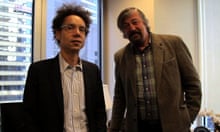Malcolm Gladwell's new book promises to turn your view of the world upside down. We all think we know what happened when David took on Goliath: the little guy won. Gladwell thinks we all have it wrong, and opens his new book with a retelling of that story.
Our mistake is to assume it's a story about the weak beating the powerful with the help of pluck and guile and sheer blind faith. But as Gladwell points out, it was Goliath who was the vulnerable one. He was a giant, which made him slow, clumsy and probably half-blind (double vision is a common side-effect of an excess of human growth hormone). The only way he could have beaten David was by literally getting his hands on him – but David had no need to go anywhere near him. David had a sling.
Ancient armies contained teams of slingers, who could be deadly from distances as great as 200 yards. The best, like David, were lethally accurate, and Goliath was not a small target. Once David had persuaded the Israelites that single combat didn't need to mean sword versus sword, but could be any weapon you like, there was only ever going to be one winner. As Gladwell says, Goliath had as much chance against David as a man with a sword would have had against someone armed with a .45 automatic handgun.
This gives Gladwell his theme. The strong are often surprisingly weak, if looked at from the right angle. People who seem weak can turn out to be surprisingly strong. Don't be a Goliath. Dare to be a David. Gladwell illustrates these lessons with a characteristically dizzying array of stories, the subjects of which range from high school girls' basketball to child murder and the Holocaust. Most of them are great stories. The trouble with the book is that they are not great illustrations of his chosen theme.
The ones that work best are about not being a Goliath. A particularly moving chapter describes the mistake made by Mike Reynolds, a Californian whose daughter Kimber was murdered in 1992 by a man out on parole for car theft. Reynolds's response was to propose the three-strikes-and-you're-out law, which made life sentences mandatory for anyone convicted of three offences, no matter how minor the last. He got his law passed by referendum under California's quirky political system. It proved a costly and counter-productive disaster. It did nothing to stop violent crime but it put massive strain on the criminal justice system. It was manifestly unjust. Reynolds believed that the best way to fight back on behalf of his daughter was to call on the most powerful weapon he could find: the Californian state. But his law made the state clumsy and half-blind. The most powerful weapon turned out to be a useless one.
The error we often make is to double-down on strength when we think that we need something more effective than what we've got. Yet past a certain point, extra-strength becomes self-defeating because it is too crude and inflexible. Gladwell gives a compelling version of the same argument in relation to school class-sizes. Big classes (35 and up) are known to be bad for kids. So it's good to make them smaller. But many schools keep making them smaller on the assumption that more of what works must be better.
There is good evidence that small classes (18 or fewer) are also bad for kids, because the child-teacher dynamic becomes stale and unimaginative. Somewhere in between is what keeps everyone on their toes. Gladwell thinks countries across the western world have been wasting money hiring extra teachers when they should be using that money to pay the good ones more.
But the true lesson here isn't don't be a Goliath, it's don't be a Philistine – the army that sent Goliath into battle for them. The simple moral is choose your weapons carefully. The real problems arise when Gladwell gives his examples of some modern-day Davids. There is a tension at the heart of his version of the David story that he never resolves. Is it really a story about David at all? One implication of the sword versus sling mismatch is that any one of a host of Israelite slingers could have beaten Goliath. With the right training, we could all do it. On the other hand, David was the only one who spotted how to win and had the courage to break with convention (the rest of the Israelites assumed that they had to fight Goliath at his own game). In that respect he was unique. So, can anyone be a David or not? Gladwell wants to have it both ways.
This comes out in some uncharacteristic rhetorical slips as he tries to push his case. One chapter looks at the life stories of various sufferers from dyslexia who have gone on to be hugely successful in business (the proportion of high-profile entrepreneurs who are dyslexic is strikingly high). Gladwell argues that dyslexia forces people to be imaginative and resourceful, especially during their formative years, as they look for creative ways round the disadvantages of their condition.
So, he asks: "You wouldn't wish dyslexia on a child of yours. Or would you?" Well, no you wouldn't (as Gladwell admits much later on). It's a stupid question. The proportion of dyslexics who end up in jail is also strikingly high. For many people it is simply a grave disadvantage. You wouldn't wish it on anyone. So why pretend otherwise?
Many of the stories Gladwell tells about people who have taken hardships (a miserable childhood, a physical disability) and turned them to advantage aren't really anything to do with David v Goliath. They're just illustrations of the trite and misleading dictum that whatever doesn't kill you makes you stronger. The truth is often the opposite: it can make you weaker – only not in the select cases Gladwell has chosen. It's not clear what's to be learned from these examples because it's always possible to imagine someone faced with the same challenges suffering greatly as a result (jail rather than a successful business). That raises the suspicion that what made the difference was not, say, the dyslexia, but something else.
This problem is most acute in the final chapter of the book. Gladwell recounts the history of the remote French village of Le Chambon, which stood up to the Nazis during the German occupation. Led by their cussed priest and drawing on a heritage of persecution as Huguenots, the villagers offered refuge to Jews. They didn't hide what they were doing; they advertised it and the Nazis left them alone. Many Jews survived because of this act of brazen courage. It is a remarkable and stirring tale – it just doesn't belong in a book about David taking on Goliath.
The Nazis were not Goliath. Le Chambon didn't expose some fatal weakness. The occupiers left the villagers alone because they realised taking them on would be more trouble than it was worth. They chose to ignore it. An army of Davids beats an army of Goliaths. But if others in France had followed the example of Le Chambon, the village would have been wiped out. Ultimately the only way to defeat the Nazis was to match them for scale and power: a massive and ghastly war of attrition. Any little victories achieved within the shadow of that war, such as the one at Le Chambon, were morally, not practically significant. Cussedness isn't what makes the difference.
Malcolm Gladwell's best writing in the past has taken general trends – often identified by path-breaking research in the social sciences – and then used personal stories to illuminate them. He did that brilliantly in Outliers. In this book he goes down the alternative route of taking personal stories and then trying to hang general lessons on them. It is both more conventional and less convincing. Too often Gladwell seems to be mythologising his subjects. He treats their unusual individual histories as morality tales.
The perils of doing it that way were beautifully illustrated in a recent edition of the radio show This American Life, in a story by Michael Lewis that almost seems designed to serve as a warning about Gladwell's approach. Lewis told of a poor Bosnian refugee to the US who saw his life entirely transformed thanks to the chance intervention of an inspirational teacher at his sink school. She saw something in him that he didn't know was there. Now he is an economics professor on course for a Nobel prize. That was his story. Then Lewis found the teacher and asked her. It turned out not to be true. It wasn't a sink school. The boy was obviously brilliant. All she did was give him a little shove. He would have made it anyway.
Individual morality tales are frequently forms of self-mythologising. They don't survive dispassionate scrutiny. Gladwell's genius was always to know how to balance history and social psychology with self-help and life lessons. In this book he seems to have muddled them up.
David Runciman's The Confidence Trap: A History of Democracy in Crisis from World War I to the Present is out in November from Princeton.









Comments (…)
Sign in or create your Guardian account to join the discussion